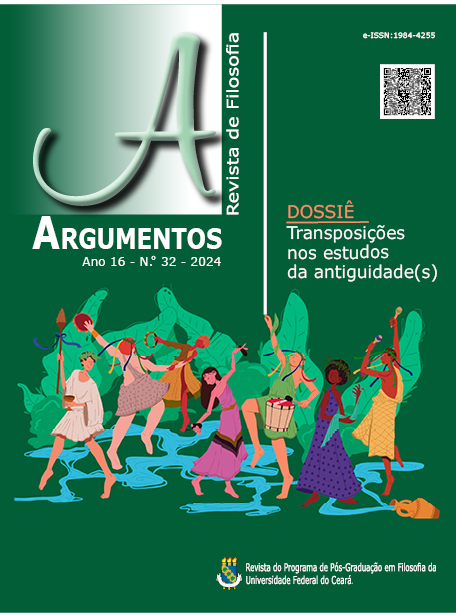Alcibiades and Sophrosyne: a look from the ancient ambiance
Keywords:
Encomium. Alcibiades. Sophrosyne.Abstract
The Platonic dialogues allow us to delve into the philosophical questions and reflections that permeated the Greek world of the classical period. Its content richness has permeated time, encouraging us to learn about and reflect on themes that are independent of time, as they remain relevant in our contemporary times, among them the theme of temperance. Thus, this article has as its reference Alcibiades' praise for Socrates, in the dialogue The Symposium, and aims to investigate the condition of the famous Athenian strategos from the category of temperance. For this investigation we have as references the virtue of sophrosyne (temperance) in the archaic and classical periods of Greek culture. We present the meaning and changes that this sophrosyne virtue underwent during these periods in the Athenian polis, as well as its conceptualization by Plato
References
BRANDÃO, J. de S. Dicionário mítico-etimológico. Petrópolis: Vozes, 2014.
FISHER, N. Hybris. A study in the values of honor and shame in Ancient Greece. Liverpool: Liverpool University Press, 2019.
HESÍODO. Teogonia. Edição bilíngue. 2. ed. Introdução e tradução de Cristian Werner. São Paulo: Hedra, 2022.
HESÍODO. Trabalho e dias. Edição bilíngue. 2. ed. Introdução e tradução de Cristian Werner. São Paulo: Hedra, 2022.
MORGAN, L. M. Platão e religião grega. In: KRAUT, R. (Org.). Platão. São Paulo: Ideias & Letras, 2013.
NORTH, H. A period of opposition to Sophrosyne in Greek Thought. Transactions and Proceedingns of the American Philological Association, v. 78, 1947, p. 425-462.
NORTH, H. Sophrosyne – self-knowledge and self-restraint in Greek Literature. Sophron Editor, 2019.
PINHEIRO, V. S. Introdução. In: PLATÃO. O Banquete. Edição bilíngue. Tradução de Carlos Alberto Nunes. Edição especial de Plínio Martins Filho. Organização de Benedito Nunes e Victor Sales Pinheiro. 4. ed. Belém: Ed. UFPA, 2018.
PLATÃO. Fedro (ou Do Belo). Tradução, textos adicionais e notas de Edson Bini. São Paulo: Edipro, 2015. (Clássicos Edipro).
PLATÃO. O Banquete. Edição bilíngue. 4. ed. Tradução de Carlos Alberto Nunes. Edição especial de Plínio Martins Filho. Organização de Benedito Nunes e Victor Sales Pinheiro. Belém: Ed. UFPA, 2018.
PLUTARCO. Vidas Paralelas – Alcibíades e Coriolano. Tradução, introdução e notas de Maria do Céu Fialho e Nuno Simões Rodrigues. São Paulo: Annablume, 2011.
SILVA, R. B. B. da. O contexto da Sophrosyne no Cármides e no I2 de Plotino. Polymatheia, Fortaleza, v. II, n. 18, jan./jun. 2018, p. 56-89.
SNELL, B. A cultura grega e a origem do pensamento europeu. Tradução de Pérola de Carvalho. São Paulo: Perspectiva, 2012. (Estudos; 168).
TRABATTONI, F. Platão. Tradução de Irineu Quinalia. São Paulo: Annablume, 2010. (Coleção Archai: as origens do pensamento ocidental, 2).
TUCÍDIDES. História da Guerra do Peloponeso. Tradução, prefácio e notas introdutórias de Raul M. Rosado Fernandes e M. Gabriela P. Granwehr. 3. ed. Lisboa: Fundação Calouste Gulbenkian, 2022.
VASCONCELOS, B. C. D. A. A temperança em diálogo no Cármides. Revista Contextura, Belo Horizonte, v. 9, n. 10, 2010, p. 17-31.
VERNANT, J.-P. As origens do pensamento grego. Tradução de Ísis Borges B. Fonseca. 25. ed. Rio de Janeiro: Difel, 2022.
Downloads
Published
Issue
Section
License
Argumentos magazine is licensed under an International Creative Commons Attribution License.
The Magazine uses CC BY inclusion
1) The authors retain the copyright granted to the magazine or the right to initial publication, with the work regularly licensed under the Creative Commons Attribution, which allows the sharing of the work with acknowledgment of authorship and initial publication in this magazine.
2) The authors are authorized to contract additional applicable contracts, for non-exclusive distribution of the version of the work published in this journal (for example, publication in the institutional repository or as a chapter of the book), recognition of authorship and initial publication in this journal.
3) Authors are authorized and encourage to publish and distribute their work online (for example, in institutional repositories or on their personal pages) at any time before or during the editorial process, as they can generate productive changes, as well as increase the impact and reference of published work.




.jpg)










._._3.png)
1.jpg)
._._._.png)
